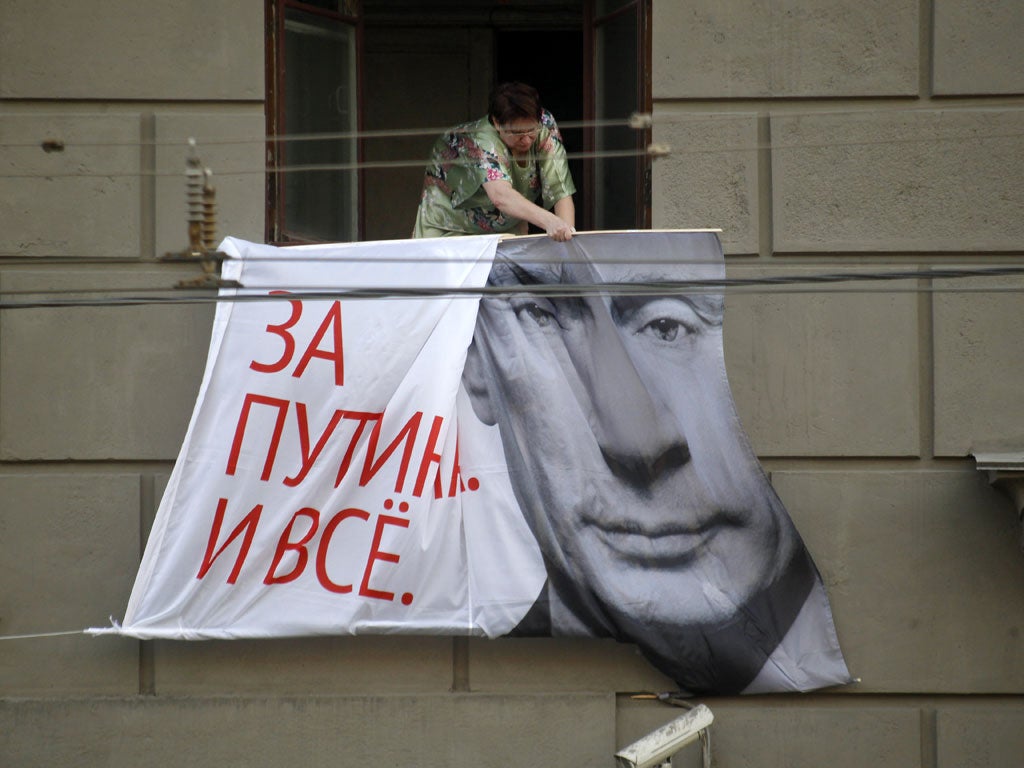Crack down on opposition? I'll do nothing of the sort, vows Putin
As Russia votes, with one clear leader, Shaun Walker reports from Moscow on the would-be President's plans

Your support helps us to tell the story
From reproductive rights to climate change to Big Tech, The Independent is on the ground when the story is developing. Whether it's investigating the financials of Elon Musk's pro-Trump PAC or producing our latest documentary, 'The A Word', which shines a light on the American women fighting for reproductive rights, we know how important it is to parse out the facts from the messaging.
At such a critical moment in US history, we need reporters on the ground. Your donation allows us to keep sending journalists to speak to both sides of the story.
The Independent is trusted by Americans across the entire political spectrum. And unlike many other quality news outlets, we choose not to lock Americans out of our reporting and analysis with paywalls. We believe quality journalism should be available to everyone, paid for by those who can afford it.
Your support makes all the difference.Vladimir Putin has denied that he plans a crackdown on opposition groups if he returns to office, as expected, in a presidential vote tomorrow.
In a meeting with foreign newspaper editors, which was broadcast on Russian state television yesterday, he said he was "not planning anything of the kind". "I don't know where these fears come from," said Mr Putin. "On the contrary all of our proposals are geared toward establishing a dialogue with everyone, with those who support us and those who criticise us."
It is a change of tack for the Russian Prime Minister, who last week referred to the need for "victory" in an "ongoing battle for Russia". He has also accused the leaders of large street protests of working in the interests of foreign powers keen to destabilise Russia. Now, in what appears to be an attempt to reach out to opponents, he says he is "glad" about the protest movement, as it forces the government to do a better job.
The country today enters an official "day of silence" when campaigning is forbidden before Sunday's presidential vote, but this is unlikely to stop the unofficial opposition shouting about electoral fraud. Mr Putin will need 50 per cent to avoid a second-round run-off. The idea of a run-off was unthinkable a few months ago, but it began to be talked of as a possibility after protests drew tens of thousands to the streets in Moscow and other cities.
There have been widespread reports of the "administrative resource" being used to influence the vote, with stories of workers in factories and government offices being pressured to vote for Mr Putin. Yesterday, reports surfaced of Moscow workers being offered £200 to vote for Mr Putin five times at different polling stations. Dmitry Peskov, Mr Putin's spokesman, claimed the reports were a propaganda trick.
At Russia's Central Election Committee yesterday, preparations were under way for the vote. The Committee and its chairman, Vladimir Churov, were criticised after December's parliamentary polls, in which Mr Putin's United Russia party won a majority despite accusations of fraud. Nevertheless, Mr Churov insists the elections are fair. "The elections will be fair and in accordance with the law," Nikolai Konkin, secretary of the Committee, said yesterday.
After complaints about December's polls, Mr Putin ordered that cameras should be installed at every polling station to safeguard against fraud. Yesterday, Mr Konkin said 13 billion roubles (£280m) had been spent on installing the cameras at 91,000 of Russia's 95,000 polling stations, which will be streamed live on the internet throughout voting. The vote-monitoring group Golos said the move was rendered pointless given the lack of link-ups at regional centres, where much of the counting takes place.
Despite accusations, there is no doubt Mr Putin is still the most popular candidate on the ballot. The most recent pre-election survey suggested he has the support of more than 40 per cent of Russians.
Standing against Mr Putin are the Communist, Gennady Zyuganov, who is still popular among older voters nostalgic for the Soviet Union; the ultra-nationalist Vladimir Zhirinovsky; and oligarch Mikhail Prokhorov, possibly with tacit Kremlin backing. Leaders of the opposition coalition that has been behind the recent protests, such as Alexei Navalny, the anti-corruption blogger, are not represented at the elections.
A protest is planned in central Moscow for Monday evening, with the unofficial opposition declaring the election illegitimate before it has happened.
Hunger strike ends after 11 days as PM intervenes
Councillors in the southern town of Lermontov have ended an 11-day hunger strike after Vladimir Putin intervened and their demands were met. Eight councillors went on strike, as reported in The Independent last Saturday, after the council was disbanded, they claimed under pressure from a corrupt governor. New elections were planned for Sunday, at the same time as Russian presidential elections, and the old councillors were barred from standing on technicalities. They went on a hunger strike, and by midweek, nearly 40 people had joined in; three were hospitalised. On Thursday, the chief of Mr Putin's election campaign promised the Prime Minister would take control of the case, which prompted them to end their fast.
Yesterday, a court postponed the local elections until May, so the situation could be investigated.
Join our commenting forum
Join thought-provoking conversations, follow other Independent readers and see their replies
Comments